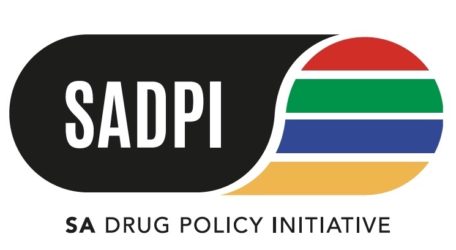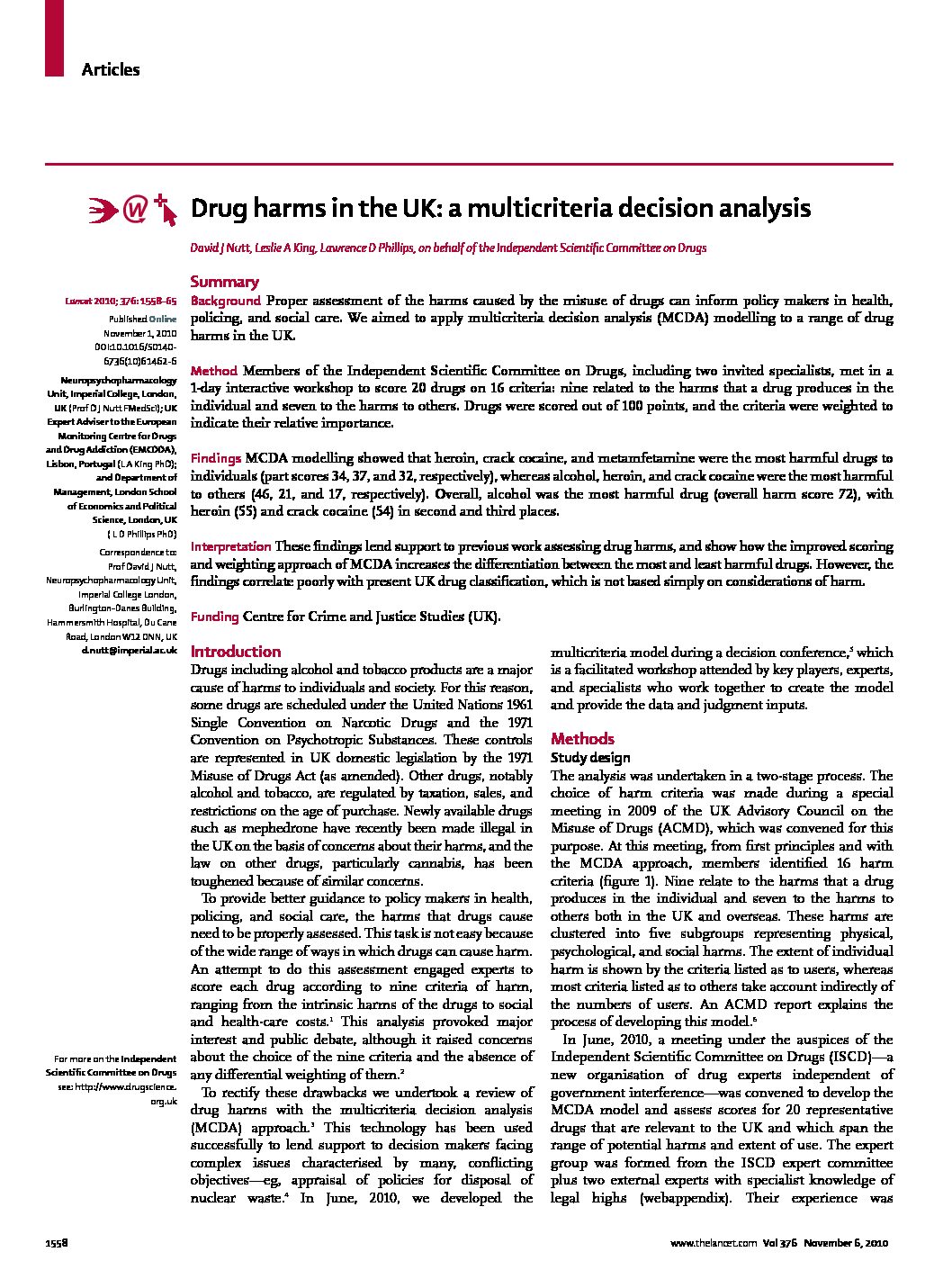ARTICLES
South African Drug Policy Initiative
Advocating for humane, rational drug laws to reduce drug-related harms

Contents (click on titles to link to articles)
* National Anti-Gangsterism Strategy in the Western Cape
* SADPI Response to South African Health Products Regulatory Authority
* Marijuana use in South Africa: What next after landmark court ruling
* How to Make The Case For Legal Regulation
* After the War on Drugs: Blueprint for Legal Regulation
* How to Win the Global Drug Policy Debate
* Advancing Drug Policy Reform: A New Approach to Decriminalisation
* The World Drug Perception Problem: Countering prejudices about people who use drugs
* Alternative World Drug Report: Counting the costs of the War on Drugs
* Crime Networks and Governance in Cape Town
* Drugs, police inefficiencies and gangsterism in violently impoverished South African communities
* The war on drugs has failed: Doctors should lead calls for drug policy reform
* Drug harms in the UK: A multi-criteria decision analysis
* Developing an advocacy agenda for access to opioid substitution therapy in South Africa
* From The Mountaintops: What the world can learn from drug policy change in Switzerland
Strategic roadmap towards implementation of the National Anti-Gangsterism Strategy in the Western Cape 2019
This groundbreaking report, commissioned by the Western Cape Government in South Africa, calls for the legalisation of all drugs as part of a strategy to deal with the scourge of drug related crime and gangsterism in the Western Cape Province
SADPI Response to South African Health Products Regulatory Authority (SAHPRA) Statement on Cannabis Products
The SAHPRA notice makes it clear that this government department fails to take responsibility for the confusion over the status of medical cannabis and distorts the recent South African Constitutional Court ruling on the decriminalisation of cannabis for personal use.
Marijuana use in South Africa: what next after landmark court ruling
Anine Kriegler
On September 18, 2018 South Africa’s Constitutional Court delivered a unanimous judgment that certain parts of the country’s drug laws are inconsistent with the right to privacy. Adults are now allowed to use, possess or cultivate cannabis in private for their own personal consumption. But there is much more work to be done to design a humane and rational system to regulate cannabis. Some of the key issues that will need to be addressed include how far privacy extends, exactly what products should be regulated, how non-users will be protected, and what to do about the existing criminal market.
Legalising Illicit Drugs
Keith Scott and JP Van Niekerk
All but a handful of countries signed the United Nations Single Convention on Narcotic Drugs in 1961. This treaty and two related conventions were established to prohibit the use of and trade in a range of drugs and have been used as the basis for the standardisation and enforcement of drug laws in most countries. The fundamental philosophy driving their formation and implementation is the goal of a global society free of all drugs that are deemed to be harmful, alcohol and tobacco being notable exceptions. However, nearly 60 years later, the resulting UN-driven War on Drugs has failed miserably and has inadvertently created a trillion dollar illicit drug trade controlled by international networks of powerful drug syndicates. This mistaken policy has brought about a legally sanctioned global human rights tragedy that has ruined the lives of millions of people.
How to Make The Case For Legal Regulation
This is an excellent guide to making the case for the legal regulation of drugs from a position of confidence and authority. Organised into 12 key subject areas, it provides an at-a-glance summary of the arguments for legal regulation, followed by commonly heard concerns and effective responses to them.
After the War on Drugs: Blueprint for Legal Regulation
Blueprint for Regulation lays out a set of practical and pragmatic options for a global regulatory system for non-medical psychoactive drugs.
How to Win the Global Drug Policy Debate
This is a guide to making the case for drug policy and law reform from a position of confidence and authority. It is for every policy maker, media commentator and campaigner who not only recognises that the so-called ‘war on drugs’ is a counterproductive failure, but also wants to convince others to support reform.
Advancing Drug Policy Reform: A New Approach to Decriminalization
This report advocates ending all penalties on people who use drugs. Detailing the destructive and harmful consequences of punitive drug policies and the need to reconsider them, the report calls for the implementation of alternatives to punishment for all low-level, non-violent actors in the drug trade, and to consider market regulation as the next logical step.
Global Commission on Drug Policy
The World Drug Perception Problem: Countering prejudices about people who use drugs
Governments are responsible for correcting false perceptions of drugs and people who use them by providing evidence-based information, which is easily and widely accessible. In their speeches and by their very attitude, political and religious leaders must show their respect for the dignity and rights of all citizens, particularly the most vulnerable and those who are victims of social stigma.
The Alternative World Drug Report: Counting the costs of the War on Drugs Steve Rolles, George Murkin, Martin Powell et al
The enormous costs of drug misuse itself have been well documented and ever-present on the agenda of high-level political discourse. In contrast, the serious negative impacts of drug policy enforcement interventions are left largely unevaluated and ignored. Ultimately, this document is a call to apply science to an area of policy that has eschewed adequate scrutiny for far too long.
Crime Networks and Governance in Cape Town: The quest for enlightened responses
Charles Goredema and Khalil Goga
The state cannot exercise its authority in many areas of Cape Town where organised crime wields significant power, has capitalised on economic opportunities, and can manipulate and corrupt the state. Solutions to eradicate organised criminal networks generally do not acknowledge the underlying context that sustains them and also stress stronger policing and repression, while paying insufficient attention to deficiencies in other state capacities. State interventions need to be more holistic, more carefully considered and should acknowledge that much organised crime reflects a dysfunctional society in Cape Town. Without an overarching strategy of reform, organised crime will continue to plague affected communities.
Drugs, police inefficiencies, and gangsterism in violently impoverished communities
Yashar Taheri-Keramati
This timely research paper concludes that public criminals related to the state, such as police, and private criminals, such as gangsters, work together in a multitude of ways in a bid to acquire wealth, most notably through an illicit drug market today dominated by ‘tik’ (methamphetamine). It is shown that this violent narcotics market binds police and gangsters together while creating a state of insecurity for the poor.
Taking a New Line on Drugs
Royal Society For Public Health
This UK report seeks to explore a different approach to drug policy by setting out how we can move away from viewing drug use through an ideological lens and instead take an evidence-based approach aimed at improving and protecting the public’s health and well-being.
The war on drugs has failed: Doctors should lead calls for drug policy reform Fiona Godlee and Richard Hurley
This BMJ editorial emphasizes that evidence and ethics should inform drug policies that promote health and respect dignity and that doctors and their leaders have ethical responsibilities to champion individual and public health and human rights.
Drug harms in the UK: a multi-criteria decision analysis
David J Nutt, Leslie A King, Lawrence D Phillips, for Independent Scientific Committee on Drugs
This paper published in the Lancet describes the system of Multicriteria Decision Analysis as applied to drug harms to both users and others. Its findings confirm that the present drug classification systems bear little relation to the evidence of harms caused by drugs and the laws that are used to control them.
Developing an advocacy agenda for increasing access to opioid substitution therapy as part of comprehensive services for people who use drugs in South Africa
A Scheibe, M Marks, S Shelly, T Gerardy, A Domingo, J Hugo
This editorial in the South African Medical Journal advocates for the roll-out of interventions that reduce harm, not increase it.
From The Mountaintops: What the world can learn from drug policy change in Switzerland
Joanne Csete
This report describes how Switzerland's seminal change in drug policy towards heroin users dramatically reduced drug use, drug-related deaths and property crime committed by drug users.
Open Society Foundations
